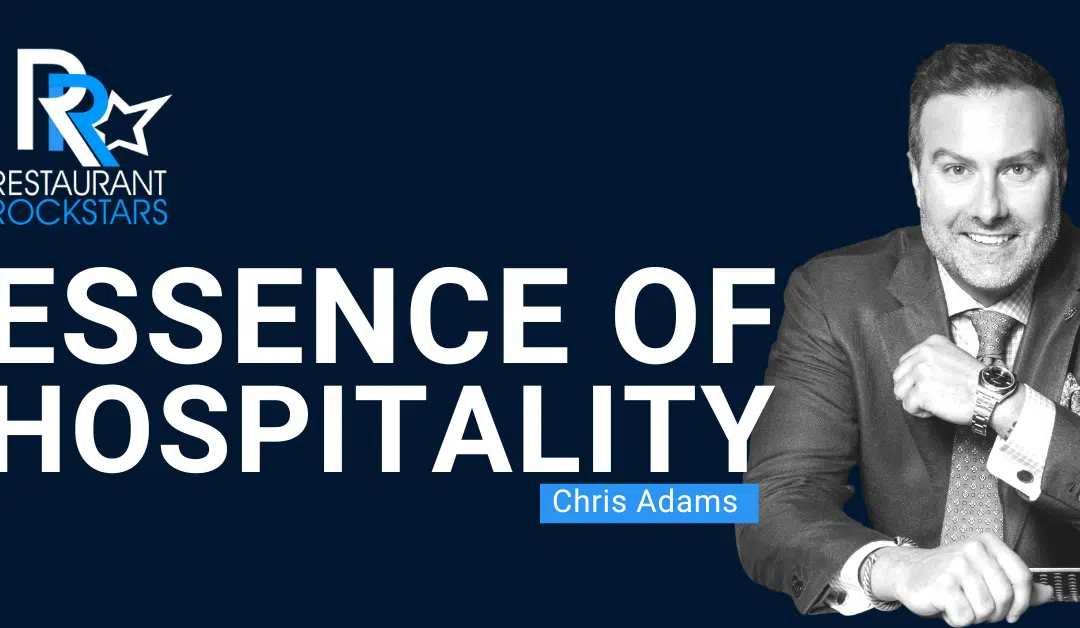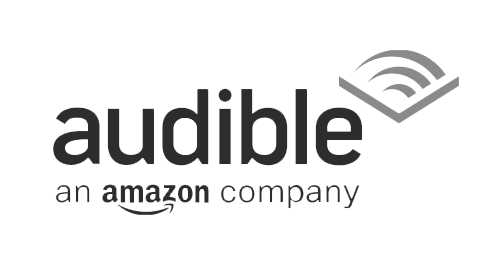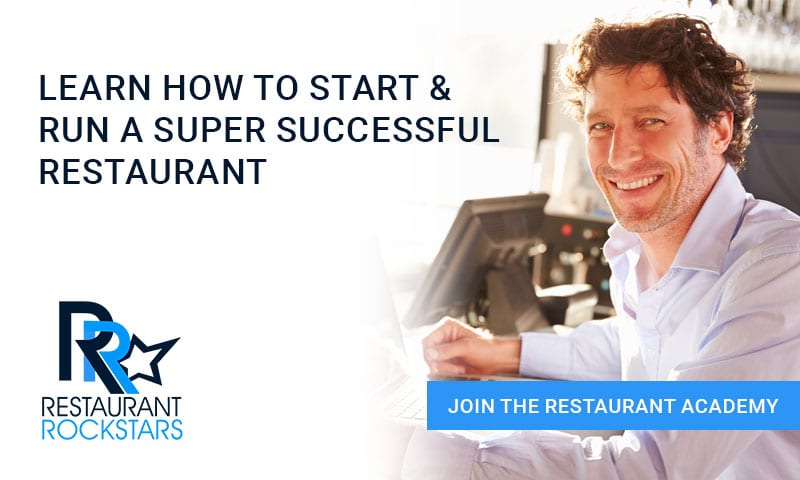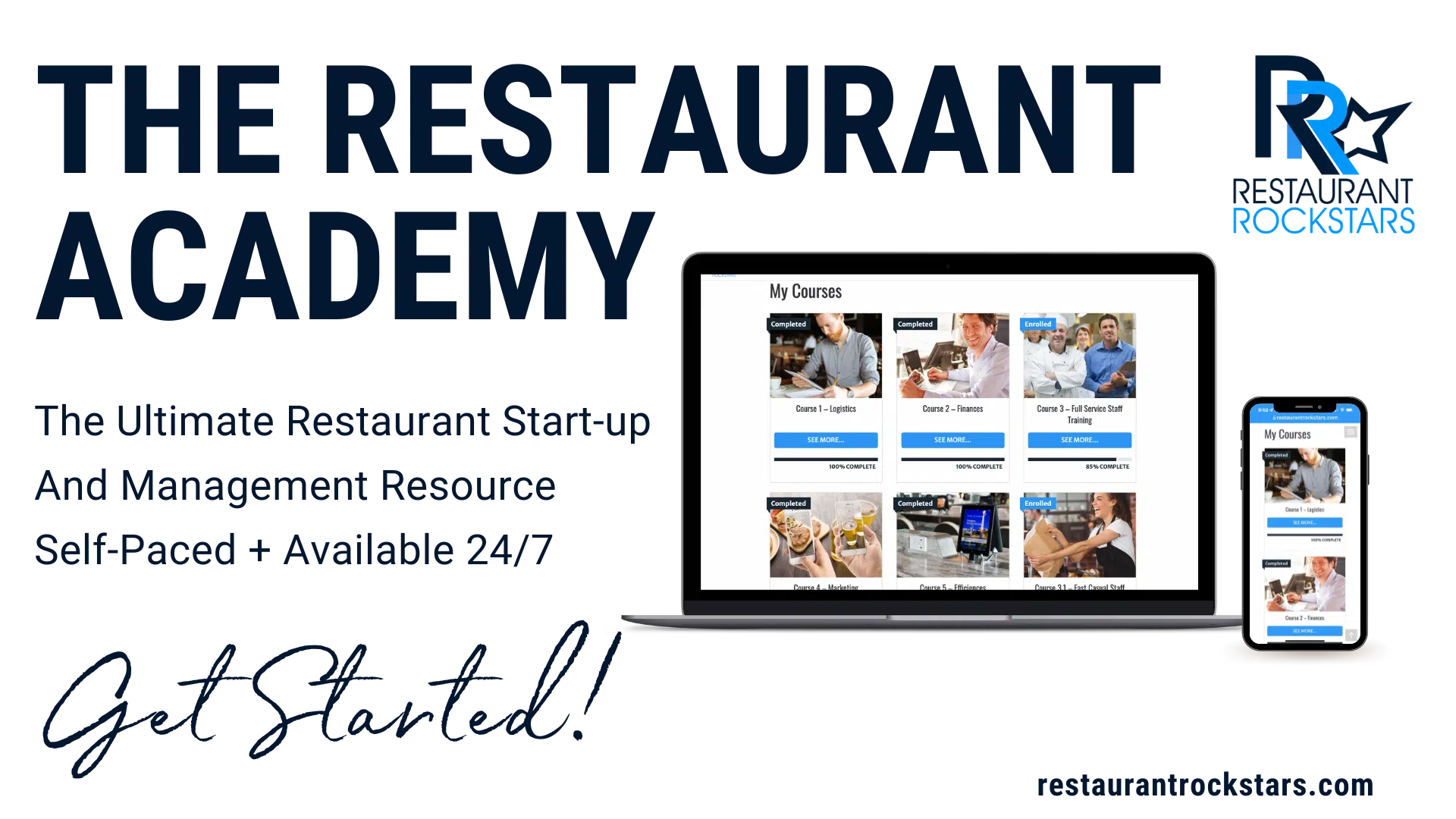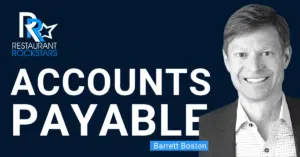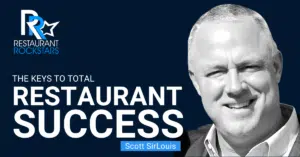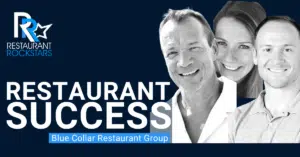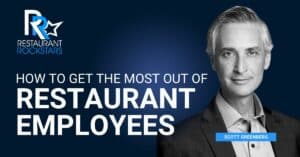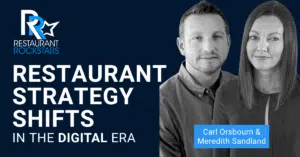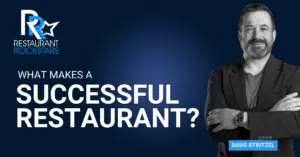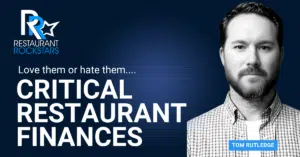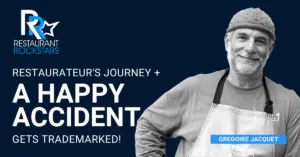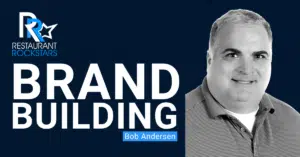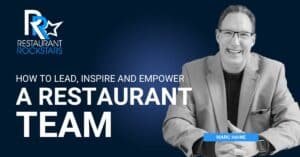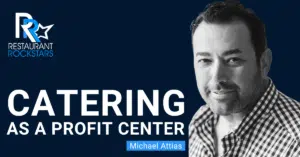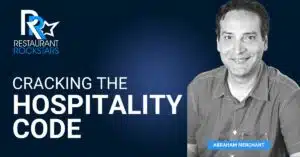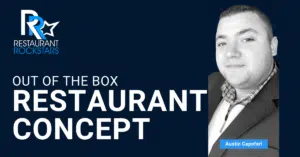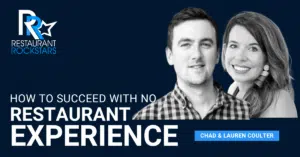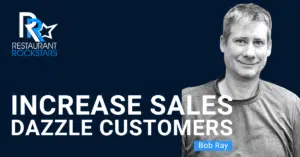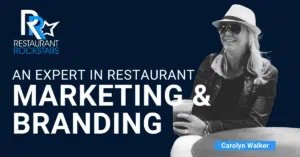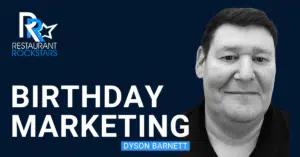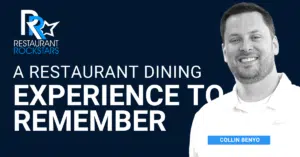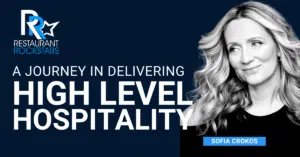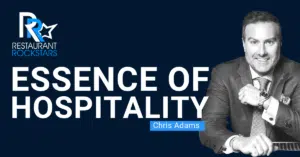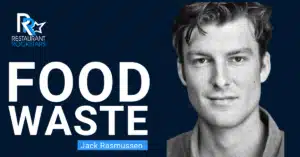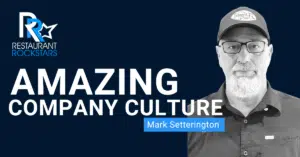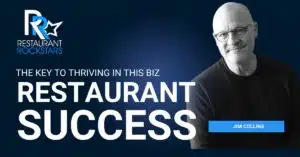Restaurant Rockstars Episode 293
The Essence of Hospitality
LISTEN HERE OR ON YOUR FAVORITE PODCAST PLAYER
Prefer to watch the interview?
Click the video below.
Hospitality defines our business and delivering amazing guest experiences is the name of the game.
It’s about leveraging a true competitive advantage.
Why?
Because you’re passionate and proud of your operation, your people and the products you serve.
In this episode of the Restaurant Rockstars Podcast, I’m speaking with Chris Adams, CEO and Founder of the Ellis Adams Group, an international hospitality consulting firm that works with some of the leading hospitality brands around the globe.
Listen as Chris shares:
- What it takes to rise to the top of this business… share this with your entire team!
- The impact leadership style has on developing your staff
- How our industry can re-invent itself during these most challenging times
- Why “reflective thinking” leads to his best ideas
- The importance of making mistakes and why “failure” is not failure
- The new future “culture” for both guests and staff
And of course, the essence of hospitality and how to stand apart from the competition.
Listen on, then go out and exceed your guest’s expectations!
ROCK On.
Roger
0:00
We’ve got to celebrate our people, and we’ve got to invest in them. We have to invest in them. I don’t care who you are in what, what you do for a living. We have made such a horrible mistake in the hospitality industry of not continuing to invest in our people. And that that’s a huge issue. That’s that’s happening right now. That is we’re bringing people into our we’re begging people to come into our organizations, but we’re not giving anything to them, for them to want to continue to pursue to continue to push themselves within our organization.
0:44
Thanks again for being with us on the restaurant rockstars Podcast. I’m constantly amazed at what people do in this business and their career trajectories. Well, my guest today is the definition of the word hospitality that is the foundation of our business. And he literally worked his way up through the Ritz Carlton Hotel Company, worked in restaurants, worked in entertainment, and then ultimately founded the Ellis Adams group, which is an International Hospitality consulting firm. And they focus on all aspects of business building and branding, concept, design, development, training, management, profit margin increases, you name it, all the key elements are there. Now they currently have 100 projects going around the globe, which is pretty amazing stuff. This episode is all about hospitality. Don’t miss it. Stay with us.
1:33
You’re tuned in to the restaurant rockstars podcast, powerful ideas to rock your restaurant. Here’s your host, Roger Beaudoin.
1:50
People go to restaurants for lots of reasons. What the customer doesn’t know is the 1000s of details it takes to run a great restaurant. This is a high risk high failed business. It’s a treacherous road and SMART operators need a professional guide. I’m Roger. I’ve started many highly successful high profit restaurants. I’m passionate about helping other owners and managers not just succeed, but knock it out of the park. You don’t just want to run a restaurant, you want to dominate your competition and create a lasting legacy. Join the academy, and I’ll show you how it’s done. Welcome back, everyone. This is the restaurant rockstars podcast. And with me today, Mr. Chris Adams. He is a luxury hospitality leader, and also the CEO and founder of Ellis Adams group. Welcome to the show. Chris, how are you?
2:37
Good. Thanks so much for having me. Appreciate it?
2:40
Well, you know, I wish that we had well, we’re actually learning more and more about luxury hospitality, we’ve had a couple of different hospitality hotel groups, you know, in a large scale, but this one is obviously the biggest so far. And we do have an audience of hotel operators with restaurants within their hotels. So I think it’s totally relevant that you’re here. But you have so much to share. So I’m excited to have you with us. Why don’t you start Chris by again, telling us your hospitality backstory? And then I’m gonna ask you what your definition of luxury hospitality is. But take us through that first.
3:11
For sure. You know, it’s, it’s funny. I didn’t grow up in hospitality. You know, I didn’t have that. Going through school, as you notice the server going through school or anything like that. I’m actually grew up in the entertainment industry. And by chance, it was a summer job that was supposed to keep me out of trouble. And it was a part time. Yeah, exactly. It was a part time pool attendant position with Ritz Carlton hotels, I had no clue what I was walking into, didn’t know what to expect. I just knew that, you know, it would give me something to do for the summer. And we’ll go from there. And two days into that countdown, I knew this is where I’m supposed to be. And my life forever changed. From that moment on, I walked away from music, worked my tail off. And 20 plus years later, I have, you know, in my opinion, the coolest job on the planet. And so it was, it was not something that was planned. It wasn’t a trajectory that I was, you know, I was shooting for when I went into that position. But I knew beyond a shadow of a doubt that when I was sitting in that room and listening to them talk about what hospitality was and what the culture was of Ritz Carlton. It was it I just, it’s something it struck a chord with me like, I don’t know what I’m supposed to do. I have no clue what this hospitality thing is. But it’s, it’s where I’m supposed to be. And I think that was the moment that I figured out what my purpose was. And the rest is history.
4:40
You know, that’s so interesting. We share a similar background in that my first job I started out at a private country club as a dishwasher that only lasted a couple of weeks, and they saw something special in me. And they quickly promoted me to bartender even though I didn’t know how to bartend so I got trained and what happens man? Yeah, all right. So I quickly got trained But now I’m in charge of, you know, all all the pros and the club members that came through on a daily basis. And I’m mixing their martinis in between rounds of golf. And I quickly realized the connection because they’re throwing this I was a teenager as well to throw in $20 bills and me every time I serve a drink, and although that was really great money when I was in high school, I realized that there was something genuine about delivering great service. That was my indoctrination in the hospitality. And I’m sure, you know, at Ritz Carlton when you’re a pool attendant, I’m sure people are tipping you and giving you gratuities, but that’s not why you do it. It’s like, okay, this was a summer job for you. But then suddenly, it became something more, but it triggered that whole initial thought about what hospitality means and and now you’ve gone on to such great heights. So take us after that what you did next.
5:48
Yeah, you know, and to piggyback on what you’re saying, I couldn’t agree more. I think hospitality is one of those things where it’s either in you or it’s not. And it’s a Marriott causes spirit to serve, I call it a you have a heart for others, that I didn’t realize growing up that my grandparents had a four bedroom home. And there was never a time from the time I can I have memories as a child, until when my grandparents passed away. There was never a time I can think about that there wasn’t someone living in one of the bedrooms that I didn’t know. But they became uncle so and so were aunt so and so. And my grandparents were this those people that their house was always open. And they were taking in people that were, you know, down on their luck or in between jobs or just passing through town. And they were the ultimate hotel yeas, and I didn’t realize I was being primed as a young child, witnessing probably some of the best hospitality you’d ever come across. And it was creating in me, honestly, the DNA and establishing something that now I put into practice every single day of my life. But it was It wasn’t because I grew up necessarily in the quote unquote, hospitality industry, I was just exposed to it at a young age through a personal experience with with my own family. And so it’s a, it’s been a wild ride to take that, pull it in that position, worked my tail off learn. And I think the biggest thing for me was learning how to accept failing, and, and being okay with it. Understanding that failing doesn’t make you a failure. And that’s part of the process. And the minute that you know, our company now I pushed my team hard to be creative to think outside the box, I pushed them to fail. I believe if we don’t make mistakes, we’re not pushing hard enough, that means that we’re staying status quo being way too complacent and the choices that we’re making. And that’s okay, right. As long as we learn from it, as long as we’re failing forward, then we’re doing the right thing as a brand. And I became okay with that. In the beginning, I was scared to death because I didn’t know what I was doing. And I was just reading constantly and trying to learn from everyone around me. And I went up the ladder way too fast, to be perfectly honest. And I put myself in a position that I didn’t want to fail, right, I didn’t want to screw up because this was my opportunity. And when I finally did, I had to learn how to be okay with it. And I had to learn how to how to how to learn from it. And that helped push me to the next thing and I went on from it’s Carlton became an exact for them left, Ritz Carlton opened up my first restaurants and bars and did really, really well with it. And then I failed really, really hard. To the extent of I mean, I failed really hard. And, and that was okay. It was embarrassing. It was humbling. It put me back in a in the place I needed to be from a mindset standpoint, I was young, and I found a little bit too much success too early and thought I knew what I was doing. And I really didn’t. And that was part of the process. And I look back now I had someone asked me recently, if you could go back, what would you changed in this process? And I said absolutely nothing. Yeah, I wish I would have made better choices. And along the way as a human being, I’m sure I hurt people at different times. And, and yeah, you’d never want to see that. But if I had to go through everything I’ve went through to get me to where I’m at right now with where my brand is and how it’s growing every single day. If that’s what it took to get me to this place, then then so be it, then I’m okay with those choices and those decisions. So it’s been a it’s been a crazy ride, but damn, it’s been a good one too.
9:31
Well, you know, it’s interesting, you have a philosophy, you actually believe in making mistakes and failure is not failure. And I think you just explained that. But I love your philosophy about you push your team to fail. And that that brings up a huge difference between the word manager and the word leader, and the word delegate and the word empowerment, you know, and obviously, any manager can delegate and tell somebody what to do, but it’s the rare leader that can empower Have the team, push them to fail, give them the opportunity to grow and recognize and reward their successes. After they learn from their failures. I think that’s a beautiful philosophy.
10:11
You know, leadership, I’m obsessed with it, I have a bigger reader. I read constantly and I’m reading books on leadership and understand the psychology behind it. My father was a psychologist. So it’s very much something that I’m, I’m, you know, I’ve been around my entire life. But leadership for me is the ultimate mantle to be placed upon you. The the pressure of truly being a leader and understanding what that means and what your role is. I think that’s a it’s a lost art. In many cases, people are chasing after positions and titles, versus understanding what is your actual role when you get the opportunity to oversee other individuals, which means that it is it is my job, I believe, as the CEO of my company, to wake up every day, and maximize my team’s talent beyond what they ever thought they were capable of. It’s my job to see things in them that they didn’t realize they were they had inside them, it’s my job to clear the path for them to allow them to be great. It’s my job to get out of their way. Right? It’s my job to hire amazing people, and let them be phenomenal help give them a roadmap, give them the tools to be successful. But get out of their way and let them be great. Let them fail. And then let’s learn from it as a team, how can we be better next time, and let’s push and be better, but I want to expose people to things they’ve never been exposed to. There’s nothing great, there’s no greater satisfaction for me than seeing other people win. Like, the idea that someone else needs to fail for me to be successful is is the complete opposite. And contrary to what I believe in what we believe at Ellis Adams group, I want to see people when I believe there’s enough win out there for all of us. And the more that we can attach ourselves to others, whether it’s within my company or not, and help them succeed, then that’s what I want to do. There’s, there’s I don’t know anyone that’s ever reached out to me in my organization, whether it’s through our info at l sounds.com. That gets forwarded to me that I don’t try to respond to everyone had someone this week that reached out via LinkedIn that said, Hey, man, I read something on Forbes that you wrote, I’m struggling trying to figure something out, is there any way I can get 15 minutes of your time done? Then I did a call on spent 45 minutes on the phone just helping them figure out what where they’re going because beautiful. That’s our that’s our purpose. That’s my purpose, at least. And I can’t speak for everyone. But that’s what I believe that I’m here. I’m placed here to do
12:44
well, you’re elevating others in the industry at the same time. And there’s a gratifying feeling that comes from being you know, being that type of person and getting that type of satisfaction from within. And it’s genuine. That’s that’s a beautiful thing. I’m glad you shared that for sure. And it obviously comes through in your leadership style. And I’m sure your people appreciate that. Because it’s rare. You know, I come across a lot of managers, not so many leaders that have that philosophy. And I think everyone could take a lesson from what you just said, in how they run their operations, whether they have one restaurant or 100 restaurants, it’s like, wow, listen to your people take care what they need, fix what’s broken, you know, recognize and reward and really give them the opportunity to succeed after they learn from failure. That’s amazing.
13:29
That’s when I think that we’re part of what we’re dealing right now in the hospitality industry. And we talked about the, the labor struggles across the board. In my personal opinion, it’s, we really pull the pull the skin of the onion back, right? The layers, it got very little to do with money. It has a lot to do with people, and has a lot to do with, we stopped investing in people, we stopped caring about their future. We don’t ask questions. We don’t we don’t try and figure out what’s their five and 10 year plan of where they want to be. When we hire people in hospitality of what it’s been up to this point. It’s, I’m slammed, I gotta get through tonight shift. Are you available? And you’re getting me through today? Versus Are we really investing in our people? Do we care about their future? And do they feel valued in our organization? And I think the minute that, I got asked yesterday, how are we going to fix this? Or like, well, one, there’s not some, you know, magic eight ball answer of how this is going to get done. And it’s not going to there’s not going to be a flick of a switch where everything just gets turned around. I said, but we teach when we’re in the field on how do we drive revenue in our restaurants, right? And we always say the easiest way to drive revenue in your restaurant is at the minute that our guest trust our team members. You can write a check for anything you want when our guests believe that that server is the absolute best server there is because their knowledge because they don’t have to go ask this Chef questions about the menu. They can rattle off exactly what the guests are asking for when they believe that bartenders knowledge about what they’re getting is the absolute best. They know exactly how to make the cocktail, the history of the cocktail, the nuances of the Bourbons, the minute that trust is established, revenue follows. Well, interestingly enough, that’s what we train in our in our restaurants. Okay, well, if we want to learn how we’re going to fix this labor issue, we got to learn how to build trust back with our teams to come back into our organizations, because right now, they don’t trust us. They don’t trust what they’ve gone through. They don’t trust the fact that the minute that the pandemic hit, without the blink of an eye on people were dropped like a bad habit, whether it’s furloughs or and look, I get it. We have to be good stewards and run our business, the best way we can to stay alive. At the same time did we handle situations the right way to make our teams feel as though they were valued, they were a valued piece of our organization, and they were vital to our long term success until they trust us again, this will not change and that’s a big piece that we’ve got to figure out how to build trust back for those that we want to come back.
16:08
Not answering your phone is one of the quickest ways for your restaurant to lose a potential customer. But between serving in person customers and dealing with the kitchen, it’s hard for staff to prioritize incoming calls. That’s why your restaurant needs pop menu answering simple questions to keep your phone line tied up can be handled without pulling a staff person from your in person hospitality. Reclaim the power of your phone. Pot menu answering is powered by artificial intelligence to answer the simple questions most people call in with like, do you have outdoor seating or what are your hours within the pop menu platform you can customize answers for your restaurant and choose the voice your guests here. Plus create customized greetings. Pop menu answering picks up your phone 24/7 365 days a year turning every phone call into an opportunity. Plus pop menus full collection of tools helps optimize your restaurants website and menu streamlines your ordering experience and assist and retargeting to enable you to build long lasting relationships with your guests get help answering your restaurants calls now with pop menu answering. And for a limited time, my listeners can get $100 off their first month plus an unchanging monthly rate at pop menu.com/rockstars. Go now to get $100 off your first month at pop menu.com/rockstars. So trust is really the key to reinventing that whole model is what really is the hospitality model needs to be reinvented because of all the chaos we’ve been through in the past two years, we thought the COVID thing was almost over and it is but now the labor crisis is the biggest challenge. And hospitality is kind of taking a backseat because short staffed operations can’t serve the guests to high expectations when they don’t have the staff to do so. I mean, what a problem, right?
18:02
Yeah, then look, there’s there’s 50 Other things that we need to fix on top of that, but I believe the core that we need to establish, which is the foundation of everything else we’re going to build on? Do we need to fix the way that we pay and the structure and benefits and 100%? No, no doubt about it. But it starts with trust. I don’t care how we restructure everything. If they don’t trust us, they’re coming back with a constantly giving us side I have when when are you going to drop the hammer on me again. And that’s never a way to build the foundation of any company.
18:34
So how does a leader a manager at any level really changed the mindset, a paradigm shift so that the people that work for him are more inspired and they’re more motivated to do what needs to be done in the short term, but then somehow get that trust factor back because you know, we’re still going to over rely on people when we’re short staffed right now to go the extra mile and to really put it in and we’re beating up our people right now. I mean, they’re exhausted, obviously, because they’ve had to pick up the slack for all the people that aren’t there. You know, that’s a real delicate balance. I mean, do you have any ideas how we can reestablish trust, other than our approach to leading them and, and how we listen to them and communicate. I think communication is key clearly. But I don’t even
19:17
know no communications key listening. truly listening, ask questions, not with the intent of giving a response. But listen, right, let’s hear what they have to say and make sure that we’re we’re taking in consideration those things that they’re telling us. The next thing is we’re going to take it we’re gonna have to take it on the chin for a minute. Right? It our margins might not be as good as we’d like them to be on the front end because we’ve got to prove we’ve got to earn back the trust of those that are around us. We’ve got to celebrate our people, and we’ve got to invest in them. We have to invest in them. I don’t care who you are in what what you you do for a living? We have made such a horrible mistake in the hospitality industry of not continuing to invest in our people. And that’s a huge issue. That’s that’s happening right now. That is we’re bringing people into our we’re begging people to come into our organizations Exactly. But we’re not giving anything to them, for them to want to continue to pursue to continue to push themselves within our organization. And that is a huge problem. I mean, can you imagine going into any role outside of hospitality, whether you’re a doctor, whether you’re a lawyer, or attorney, and you’ve given you’ve been given no tools to succeed, right? You’ve been given no tools to succeed, you’ve been given no ability to go out and actually do your job to a high level. And, and they just sit you out there on day one and go, Hey, you’re in the courtroom tomorrow. Good luck. I mean, that’s, you think about that. And you go, No, that would never happen. That sounds ridiculous, right? Yeah, we do it every single day in the hospitality industry. I can remember you talked about, you’d become a bartender. And you literally got promoted from dishwasher to bartender. Similar situation for me. My first bartending gig was there was no training I showed up, but the other guy didn’t. The only thing I knew about bartending at that time was the lady ordered a cause of politan. And it needed to be pink. So I kept pouring stuff until it was pink. And I assumed Well, damn, I must be a mixologist now. Right.
21:27
I mean, that wasn’t a deal was all the problems.
21:30
I had no clue what I was doing. Yet. 20 years later, you’ve got bartenders that you ask them, What formal training have you had, how much of investment was done for you to be the master of your craft, and they look at you like you’ve got three heads going. I mean, I don’t know I show up every day. I’ve just kind of learned over time I had bill that was here before me. And he seemed to be halfway decent. And he kind of showed me some stuff. And now 22 years later, I’m a bartender. That’s, that’s, and then we sit back down in a labor shortage. And a while I don’t know why they don’t trust us. We’ve invested nothing in them. We’ve asked everything of them. We’ve asked them work nights, weekends, you know, it’s thankless every holiday. And then we wonder why they don’t want to come back or, you know, it’s crazy that we still think that,
22:18
well, going back to that empowerment thing, it’s great if a leader can recognize the fact that people will, everyone works for a paycheck, of course, but they also work for praise and recognition. But they also work for more responsibility and a chance to feel like they’re valued in an organization. And I always had success incentivizing people to rise up. And if you came up with a great idea that saved us money, that was an additional profit center in our restaurant, anything that could be trackable in terms of a return on investment, I gave those people a percentage of everything we could track that came in. And that did wonders for us, you know, and we built this dream team staff in what is normally considered a high turnover industry, you know, so things like that, and I’m sure you can relate to that. And I’m sure you’ve got your own stories about what you can do to and develop management talent as well. I mean, you can take someone with absolutely no experience that came from a different industry, but you recognize something special in someone, and you could see that they got leadership potential, and they have the wherewithal to take on some additional responsibility, give them that chance to fail, but you nurture them and develop them along the way. And overall, you’re going to come out on top, and those people are going to be better for it. And your organization is as well. So I’m a huge believer in what you’re saying.
23:36
Yeah, you gotta I mean, what you’re talking about is we got to think outside the box, right? It just, we have to be creative, what we do, and I heard somebody say yesterday, which was phenomenal, it said, meet people where they’re at, right, not everybody has the exact same path to get to where they’re trying to go. Not everyone wants to be the manager, not everyone wants to be the director, not everyone wants to be the general manager. But that doesn’t mean that they don’t want to progress in their career in some capacity. So we have to think outside the box to say, Well, okay, you don’t want to become the general manager, what do you want to do? Well, man, I really just want to do XYZ, well, you know what, I can make that happen and get you more money without you having to be the trial manager. So I think sometimes just saying, Well, hey, the path to get from from from one to 10 is 12345. And that’s just the way you get there. Instead of saying, hey, what path do you want to take? Or where do you ultimately want to be? And how can we figure out and get creative and putting him in a place that and I always say that your passion has to intersect with what your purpose is, and what your natural talents are? We cannot there’s a saying that I’ll say often that says, Be careful to never let someone else’s passion cause you to pursue their purpose, right, which says, Be careful that we don’t look based on social media and Instagram that I’m pursuing someone else’s passion because that looks fun, or I like the car they drive or I Wish I had that lifestyle? If that’s not your purpose, you have to get honest with yourself to say, What am I naturally gifted at? What does that just like God given? I don’t know why I just happen to be good at this and figure out how do you connect that with what you’re passionate about the minute you can do that, it’s game over and money will follow.
25:20
restaurant owners and managers. I call this the business of 1000 details. And you’ve got more important things to worry about than calculating and paying your monthly sales tax on time. Well, that’s what Devo comes in. Devo puts sales tax on autopilot for restaurants, devil uses sales tax data from your point of sale system to set aside the exact amount of sales tax you collect every single day, and then files it and pays it when it’s due on time for your restaurant every month. Devo takes just five minutes to set up. And once it’s up and running, you never have to worry about paying sales tax again, Devil costs 4999 per POS connection per month, and your restaurant can try Dabo for the first 30 days free devil was created by a successful restaurant chef and owner who knows what’s important for your operation. Time is money, and you’ve got more important things to focus on, like pleasing your guests. You can’t put a price on peace of mind, why not try Dabo for the first 30 days at Devo sales tax.com.
26:22
Yeah, but when we chase after other people’s passions, because we’re pursuing what their lifestyle is, it is going to be a lonely road with constant failure, that not letting you fail forward. And that’s that is a place you don’t want to be.
26:38
I made that mistake after graduate school. You know, I went to a business school and it was so Uber competitive. And everyone thought when they got a school, they were either going to be CEOs of Fortune 500 companies are they’re gonna rule the world. And that was the mindset for those two years I was there. So when everybody got out, it was this big competition, who was going to have the biggest paycheck, who was gonna have the best title, all that kind of stuff. And I pursued some opportunities that just were not right for me based on what you just said. So it’s absolutely true. Should be what what really lights you up inside, what’s your passion? Find your true purpose, and apply yourself to that you’ll be happy every single day and like you said, the money will follow. So absolutely. Spot on. That’s that’s absolutely true. Let’s talk about how you got to found Ellis Adams group, are we missing anything in the middle and, again, luxury hospitality is a specialty. And now that is your expertise. So tell us how you made these relationships with these premier properties around the globe? You got to I’m sure you have a crazy travel schedule. But tell us about what you know what your typical life is like. But first, how did it all begin for you? Like where did it Where did you connect the dots for
27:47
us? Yeah, you know, it started as a bulletin it with Ritz Carlton and understanding what, what the culture was of Ritz Carlton at that time. And it was about, there’s a story that I always tell when I first started in helping me understand truly what Ritz Carlton is. And it goes it basically said, if the guest wants a pink elephant, get the guest, a pink elephant. If you can’t find a pink elephant, get a horse painted pink convinced the guest that’s an elephant. And what they were, what they were telling me was, I don’t care what you have to do. Yeah, just whatever it takes, yes, happy. I don’t care what your title is. I don’t care if you’re the general manager, if you’re the steward, the housekeeper, the bartender, you have one job, don’t get it twisted. Your job is to make people happy. That’s it. And when I understood that, it was a game changer for me on my outlook of what I was doing, I wasn’t doing it for money. I didn’t even understand the tip process. I didn’t understand if I did something and people would hand me a $20 bill that was confusing to me. I was told you get paid $7.50 An hour and it was my job to make people happy or like cool. Got it. So it really started with me of understanding what the culture was of Ritz Carlton during that time. And that’s been the foundation of everything I’ve done since I can tell you that I have a soft spot for for Ritz Carlton because of that my brand doesn’t exist without that initial opportunity that I was given for the Ritz Carlton Hotel Company. And along the way of realizing that that’s I get it. That’s just my I understand it. And the thing that I started to understand is, and you had asked this question kind of earlier is what is luxury, right? And when we talk about luxury, most people think about luxury from the standpoint of marble floors and chandeliers and over the top opulence. Luxury is nothing more than a feeling. That’s it. Luxury is a feeling. It’s how you make people feel. And I don’t care if you’re at a select service hotel, or if you’re at a Ritz Carlton, a Mandarin Oriental, a St. Regis How you make them feel determines their experience. And when we talk about luxury, that feeling there, you know, there’s actual data that’s out there that talks about when you go into a luxury store. So I’m going to use Christian lube Aton. And they’re red bottom shoes that you know, you’re going to spend 1500 $2,000 for a pair of these shoes. There’s actual data that says that when you walk into the store, after you’ve swiped your credit card, and they hand you that bag with those red bumps in it, that you physiologically leave the store walking differently than when the way you walked in. And it’s only because something’s happened in our brain that makes us feel something that’s all luxury is, if I can make you feel something in those feelings. You know, sometimes it might be marble floor, sometimes it might be chandeliers, but I can tell you, the majority of those feelings come from the ladies and gentlemen that are on the property. It’s the arrival experience when the door opens. And they say, Mr. Adams, it’s so great to see you, we’ve missed you. That’s a feeling you get on the inside, the minute that they say that it has nothing to do with the marble floors, it’s the fact that they’re doing certain things to make me feel a certain way. Which reminds me, that’s why I pay top dollar to be at this place, because of the experience and how it makes me feel. And I think
31:21
brand building is a huge part of that as well. Because brands elicit a certain image and aura that the guest the customer has, in their mind that they want to be a part of there’s a certain affinity between a brand and a guest or a customer wouldn’t. Would you agree with that? And what’s your thought on that? Sure. Yeah, I think it’s part of the feeling you’re talking about, even though the people are the ones that deliver the feeling. It’s all part of the package. It’s the music that you know, that you hear, it’s the it’s the aromas in the store, you know, if it’s a retail environment, it’s like all these things that elicit a feeling in the customer. And then the creme de la creme is the hospitality delivered by the person you’re interacting with that then delivers the goods, the message, whatever it is, right?
32:08
You hit the nail on the head, if you can, if we can take the sensory experience, right. And we have we have five senses, essentially, as a human being. The first four senses that are touched by human are the most important. The fifth senses what we pay most attention to in the restaurant business and is the one that matters least, and the fifth senses taste. And we focus all of our attention on what’s our food tastes like what are our cocktail tastes like. But I can tell you right now, if you blow the first four, if it doesn’t look amazing, and it doesn’t smell amazing, and it doesn’t sound amazing. And it doesn’t feel amazing when I touch it. No one cares how the chicken tastes. I’m just being honest with you. If I had to choose, okay, I will take a concept that is crushing it on the ambiance on the feeling that they’re creating, the moment that you walk into the doors, the lighting is dead on the decor is perfect. The architecture of the spaces dialed in. The aroma of the space speaks to the story that you’re trying to tell. When I touched the menus, the paper there that you’re using tools to the store, if I nail all that, I will take that over a place that says they’ve got the best food any day of the week, because tastes incident opinion. I can’t. There’s nothing I can do about your palette. Nothing. I can make you a cocktail right now and I can have 10 People say it’s the best I’ve ever had. I could have 10 More people say it’s too sweet to savory too salty, you name it. There’s no right or wrong answer it is an opinion. I do not want to gauge my entire business model. On an opinion. I want to be able to control it based on an experience which I can control in steps one through four. The first four senses I cannot control taste. How many places can you can name I guarantee you 10 places right now that have if I blindfolded you and and tasted the food you go, it’s mediocre. Yet they’re packed every single day, because the experience they deliver is dead on and you go back for the experience. You don’t go back for the food. Now I pray to God I have a great chef that delivers a phenomenal food experience and bartenders that nailed it on the cocktails. But I can tell you right now, if you don’t focus your attention on delivering the first four sensory experience, the taste doesn’t matter at that point.
34:21
That’s incredible. I get it completely that is a unique per sec perspective, but it is absolutely true and common sense. But most people wouldn’t approach it that way. You know, I mean, that is out of box thinking in and of itself. Opinion, taste is an opinion. And you got to nail all those other elements.
34:38
Yep. Yeah, we missed. I mean, Lord, we open hotels every week. My team as you know, I’m right now sitting in Guadalajara at a luxury hotel that’s opening next Monday or Tuesday and will open last year 300 Plus hotels this year is probably close to the same. And we missed the mark so many times where we assume that if we just build a hotel, design a hotel, that’s that’s pretty, pretty good. That that’s enough. We got these great chefs in here. And that’s enough. And I’m like, if we’re not focusing attention and spending hours looking at our lighting package, that that lighting is actually adjusting from the time the guest walks in until the time they leave that experience, that lighting should be altered throughout the day, we, in the hotel world, we we we want to push a button that says, oh, Chris, it’s on a timer at 6am. It’s this at 10am. It’s this at 2pm. It does this at 6pm and adjust again, then it goes that how the sun does it? Does it just take you from A to B the sun? Or does it gradually happen from the time you wake up until the sun set, it’s just through a natural experience, your lighting in your restaurant should be the exact same way. It shouldn’t be I should not be sitting there and happen to be there at 10am. When it goes from 80 to 60%. And you kind of look around and go, Oh, I guess the lighting just change, I shouldn’t feel it. This should naturally just evolve throughout the course of the day, our music, what we’re playing, does the music tell the story of the concept and that you’ve got for your guest, and the music should be changing from the time I come in at breakfast, I shouldn’t be listening to the same music when I’m at happy hour. And that happy hour should be different from the late night model. When I’ve finished dinner, I’m having a great time and I want to have a nightcap are we thinking about the details that are truly impacting our guests. Those are the DeBose of those little things that make such a huge difference on that experience in the feeling that we give them, which then dictates the dollars they spend. We chase dollars like crazy without doing what’s necessary to actually ask for the dollars from our guest. And that’s the part that we miss. And we scramble around nonstop trying to figure how to make more money, but we’re not doing the things necessary to actually attract it.
36:57
After opening hundreds and hundreds of hotels, some would say Oh, after a while that becomes routine. But I’m hearing that you have to keep raising the bar and where do you raise that bar? And how do you keep raising the bar after everything you’ve learned in hundreds of luxury experiences? It’s like where does it ever stop? Or it’s constantly reaching to reinvent what luxury is? And how do we tap what we just did last week or last year? You know, it’s like, how do you do that? Well,
37:26
for me, it’s I never forget what my purpose is. You know, part of my purpose is the strategy behind it is creating great experiences, you know, opening beautiful hotels, but that’s not my purpose. That’s part of the formula. But my purpose is to impact people’s lives. My purpose is to walk away from my hotel and have a bartender that says, Man, I didn’t realize what I was capable of. It’s walking away from a hotel and seeing having a manager come to me and go, Man, I want to be x and five years helped me get there. I didn’t even know that’s what I wanted in life. That’s my purpose. So every time I open a hotel, if I’m still fighting the same battle have we got to fix the lights? Your musics not right? Yeah, sure people think it’s routine. But at the end of the day, that’s not my purpose. My purpose is, are we impacting people’s lives? And I know that sounds crazy. Because you, Chris, you’re opening a restaurant Hotel? Is that really matter? Yeah, it does. I want to see, I’m looking at, I’m looking at bartenders and servers that are single moms and single dads and fighting to have a great life, that want to give opportunity to their family that are taking care of grandparents and struggling to make ends meet. They don’t need to live that way. How can I help them maximize where they’re at to be the best version of themselves. That’s my purpose. And if that means I got to figure out lighting every every four days and other hotels, and so be it. But the minute I forget my purpose, then it becomes mundane, that it becomes you forget why you do it, you lose the passion for it? Is it really necessary? I can never forget why I get up every day and do what I do.
39:03
Is part of your formula, then monitoring performance and excellence? And how do you measure those things? And how do you go back, you know, six months or a year and see what might be broken. Even though the benchmark was set, everyone understood what the benchmark was, but we’re still just people. We do make mistakes. We do have bad days. It’s like how do you maintain that high level of excellence and who monitors that within your properties?
39:27
It’s tough. It’s very difficult being completely transparent. And I can tell you, we did a study internally on this. And we said we had we had 60 70% of properties that were opening that weren’t performing at the level that they should. And at first it was a min what are we doing like we’re failing? Right? We need to go back to the drawing board and we stopped and said wait a second, though. I’ve got 70% Let’s say that aren’t performing but I’ve got 30% that are knocking it out of the park. What’s the difference? Right, let’s go back and do homework and research give me I’m a data junkie, I can’t make great decisions about great data. Right? So I said, I need to understand what is the difference? Is that a person? Is it one of our team members that’s excelling? Why do we have 30%? That’s crushing it 70%. That’s not, when the process of how we do things is pretty, we’re pretty process driven on how we do it. Right? We went back and there was one common denominator across the board that made it very easy to understand what the issue was, and the 70% that we’re not performing versus the 30%. That were. And it comes back to our very first piece that you and I started talking about. And that’s leadership, the minute that we don’t have leaders in place that truly understand what their role is, no matter what you teach, it’s not going to move forward. It is impossible to hold people accountable for something when you don’t know what to hold them accountable for. Right. And when you have leaders that don’t really understand what their position and what their purpose is, you can you basically have set up a structure on quicksand that will never get its footing, it will never take it to the next level, you will never get consistency across the board because you don’t have anyone at the top. That’s monitoring and ensuring that we have the consistent accountability of what’s taking place. The biggest issue that we have with most individuals nowadays is people hate confrontation, they never want to have a tough conversation with someone. So as a result, typically the toughest part in a process driven organization. For us, it’s a three step approach. My dad helped create this for us that said, step one, if you don’t have a written down process that doesn’t exist, period, if you don’t have written processes, you do not have a process at all. So that’s step one, we need a written process for everything we want to happen within our organization or our concept or hotel. Step two is the key to this actually working because step two says I need accountability against the process, which creates habits. If I don’t have accountability against the process, the processes are irrelevant, it becomes tacit approval, right? So if I have accountability against the process, I can create great habits. That leads us step three, which says Now it starts to dictate the behavior of my team. If I have a processes every single day, I need to put the cup to the right, not the left. And I have accountability on my team, of making sure that Hey, guys, nope, not the left the right note, not the left, not the right at some point that accountability turns into a habit. And they no longer think about putting it on the right, it now dictate their behavior, and it automatically goes on the right. If my team doesn’t have to think about the process of how to do their job, they can spend their time focused on the people, which is where we create the experiences. No one wants to do the accountability part. They don’t like tough conversations. The easiest way for me and my team, every one of my team gets a book called Radical candor phenomenal book, if you’ve never read it, I highly recommend it. And this book has been a game changer on how we operate, which says that at all times in my organization, my team has open and honest conversation because we trust each other. And they know that not just me, but we have each other’s best interest at heart. And the way I explained to my team is that I have two daughters. And they’re one of them’s a teenager, the other one is finishing up college. And I said, I have I have daughters and many of you have you might have kids or nieces, nephews, whatever it might be. And I said, radical candor is this. If I see my daughter’s doing something that I know is going to hurt their future, do you think I’m going to stop them from doing it? I’m gonna get am I going to say something to them? And the answer, always without questions will of course, you know why? Because I love them deeply. And I want to make sure that I’m doing my best to protect them and guide them to have a successful future. And I do that knowing that there’s the potential that my teenager is going to slam a door and tell me I’m an idiot and Dad, you don’t get it. You’re a moron, all these things, right? But I’m okay with taking that heat because I have her best interests at heart. The minute we’re at an organization, and we have people that refuse to have tough conversations, we’re essentially telling them, I don’t care about you, or your future. And I’m going to allow you to continue to make mistakes that will never put you in a position to succeed. Because I don’t care enough. When you flip your perception and change your mindset of what those tough conversations actually are, and you have enough trust built with your team where they go man, Chris just cares about me and he would never let me fail. It is a game changer for your organization. And the open and honest conversation you start to have oh my god, it’s eye opening what you will find out how you can make easy adjustments to your team to get so much more out of them, just by having open, honest conversation, which makes that accountability piece so much easier.
45:09
That’s incredible. Let’s talk about expectations. Now high end properties come with high end guests that have high end expectations. Sometimes you can’t please certain people. And I don’t want to speak ill of anyone. But there are certain people that have wherewithal, but they also have a sense of entitlement and certain expectations that no matter what you do, you can’t meet those expectations. I’m sure you run into that from time to time, how do your properties deal with it? And what type of response is there? Do we take the high road rise above it? How do we satisfy these people? How do we not make a scene? How do we avoid confrontation? And to add to that, we were talking about the labor crisis. And now these things are happening more frequently in restaurants, especially because prices are rising restaurants are raising their prices, yet they can’t deliver the same service and hospitality their guests have come to expect based on the short staffing. So that problem is magnified in a high end property when you’re short staffed. And these people come in having certain expectations, and somehow it’s nearly difficult or impossible to meet those expectations. If that makes sense. How would you answer that?
46:20
Yeah, it’s tough. I mean, I always say that people don’t care what it costs, as long as the experience you’re delivering is equivalent to the price point they’re paying, right? So you can charge $45 for a martini if you want to. As long as that Martini has a $45 experience attached to it, I see. Grey Goose perceived value. That’s it. So when we talk about a luxury experience, we immediately go to price point, right. So um, you have an ADR, an average daily rate of 1112 13 $1,500 at some of these reserves. And well, that just means at the end of the day that the experience is attached to the price point. So when a guest arrives on property, if we’re not paying attention to the little details, which is what creates the 12 1314 1500 hollered rate, that’s when we start fighting. That’s it. That’s when we start finding the issue where the guest says, It’s not that I’m mad, that I expect more. It’s that you tell me this is what you do. You sold me on experience on your website, on the marketing that you put out that you’re the best of the best, this is the criminal aquarium and you put a price tag attached to what you’re selling. Right. So go on to any website of any hotel right now. Then we have pictures galore, of staged experiences, to sell to the guests that are potentially coming to your area, right? You can look up 50 hotels, and in any city and go through the pictures that are all staged of fake circumstances to convince you to hit book now. And you hit book now based on what we’re being sold, which has a price point attached to it. No one has sticker shock when they show up and check into the hotel. All of us know nowadays, because we booked through online resources for the most part, we know exactly what we’re paying, we show up to the hotel. But what we’re paying is based on a marketing campaign that says you have sold me experience and experience based on that dollar amount. So when we don’t deliver, it’s because we’re not delivering on something we told them. We were right. I had a meeting planner at one point with Ritz Carlton that no one wanted to deal with. She was difficult. She was just a pain. No one wanted to deal with this meeting planner. And they said, Chris, you’re assigned Good luck, right? Yeah. So meeting Yeah. Right. So the meeting planner comes in. And next thing, you know, we just we hit it off, and end up building this amazing relationship. And at one point, we were at dinner together. And we had a couple of glasses of wine, which had a little bit more liquid courage, probably at that point. And I said, Hey, I got a question. I said, Why is it that no one wants to deal with you? Why do you have this? This reputation that you’re so challenging to work with? And she goes, Chris, she goes, it’s so funny. You said she goes, I know, I know that I have that reputation. She goes, at no point Have I ever asked for anything outside of what you told me you do? You guys fly me around the world, to give me presentations on why I should bring my groups to your hotels, and you roll out the red carpet of everything that you’re able to do and what you’re capable of and how my guests when they show up, we’re going to be blown away, and that I got on property. And we’re late to start the meeting or something that you said was going to happen didn’t happen, but I’m the difficult one. All I’ve ever asked for is for you to be what you tell me you are. And when you look at luxury, for the most part and don’t get me wrong there. There are guests out there that are beyond challenging, right and they no matter what you do, you’re you know, you can never make them happy. And that’s going to happen and you chalk it up to the business that We’re in and you let it roll off your back and know that you’re doing the best you possibly can to exceed expectations and move on. But if you play the percentages, the bulk of the guests that have issues with things that have gone wrong is because we are not living up to the story that we’re telling prior to them arriving on property. That’s it. 90% of the time, we’ve sold this mind blowing experience. And the guest walks in and says, Man, I just walked down the hall and your wallpapers torn up, you’ve got Nicks all over the floor. My showers not working right. I’m not asking for anything more than what you told me you were going to be prior to my arrival. So I think again, changing the perception of the difficult guest. You know, we talked about if you talk about Marriott specifically bond their bond boy, you know, their membership program? Yes. It’s the largest in the world. Right. I was in a meeting the other day, and I don’t quote me on this. But I was I was in the meeting, and I overheard them say that there are more there are more bonvoy members, Marriott bump members than there are Amazon Prime members. That’s pretty staggering.
51:09
That’s amazing, right? Yes. Like I would not have ever expected that. It’s crazy.
51:13
The number of people that subscribe to their loyalty program? Well, you know, when you look at that program, and you like for the new program, you work your way up the ladder, right? So you become gold or silver than gold and platinum, and then you become titanium elite, like, you know, the highest you can possibly get with Marissa. And I go, when you think about that guest that’s a titanium. What did it take to get to that level? What did they have to do to achieve that status? So let’s break down what what does it really take? Because most people say, Oh, they’re wealthier though. No, no, those are individuals that are spending more time in a Marriott branded hotel than they do at their own homes. Right. So I gave the example of a group the other day, we teach a workshop called the psychology of hospitality. And they said, in that workshop, I talked about the fact that I’m here, because I choose to be here to teach this class, no one forces me to be here, I came here because I want to be here. And the reality is, at that point, when I was teaching that class, I hadn’t seen my two daughters, in almost three months, in almost three months, I was on the road straight, either Opening a hotel teaching workshops, speaking at a conference, you name it. And I do that, because I care, because I’m passionate about what I do, because I want to impact people’s lives. So I spend more time at your hotels with that little m on it, than I do with my own children. So when you put perspective on who these guests are, they, they assume we’re family, they assume we know what they want, because they spend 90% of our lives inside of our hotels, they know our sheets and our toiletries better than we do at most of our properties. So changing your perspective and understanding that having the empathetic side of who they are as guests, which sometimes they go well, those guests are the most challenging ones, well put yourself in their shoes for a minute, be that guests for a minute, that just took three red eyes to get to your hotel that hadn’t seen their family in three weeks. And they walk into the place that their home away from home as a titanium elite. And they can’t get anybody to acknowledge them. No one knows their name, we’ve asked it four times at four different service experiences, and no one can remember who they are. No one knows, even though they stay 280 nights in a hotel that they really like x or they hate this. And they don’t like straws, but we keep putting straws. And I’m just asking you for to care, man. That’s it. I just want you to care about my experience. So for us luxury, change your perspective, be who we say we’re going to be and deliver on what we say we’re going to do. And watch it shift, the dynamic shift, watch the percentage shift, you’re going to have the handful out there that are tough to deal with. But for the most part, if we do what we say we’re going to do, the guests are blown away and happy with that experience.
54:09
That’s foundational. And that’s what every person working in the organization should subscribe to and follow on a daily basis. I think that would elevate any organization. That’s That’s terrific. You know, your ideas come from something you call reflective thinking, can you explain?
54:28
My past dictates my future. Right? My ability to I wake up every day. And I started this a couple of years ago pre pandemic of understanding and realizing that my team takes their cues from me. Right? There’s certain days that you wake up on the wrong side of the bed, right? It’s the old saying you don’t know why you’re just in a bumpy mood. And the minute that I get on that first phone call that when I’m in a funk, my team now the rest of their day is going to do It’ll be determined based on how I was on that call, which means that my clients are not getting the best version of my team, because they’re getting a version of me that woke up on the wrong side of the bed. So I have taken the approach of every single morning, and I wake up pretty early, I’m not the best of sleepers all admitted. And I sometimes send minutes, sometimes it’s an hour, it depends on how my day starting. But the first part of my day, every single day is to get me in the right headspace, to ensure that I can maximize every single experience that I come in contact with, until I put my head back down on the pillow. I never want to miss an opportunity. Because I’m letting my emotions dictate my behavior. Right? We’re emotional human beings, which means that a lot of times you make decisions based on something that happens in the moment, not realizing that that emotional behavior is many times affecting the next 510 50 years of your life. You know, hypothetically, I’m gonna give you a scenario, I wake up, I’m in a funky mood, I get some emails, and I woke up that just, you know what, today is not my day. And as I leave my house, I’m going to Well, I’m going to walk and I’m just going to get myself a Starbucks, I’m just and I’m in I’m in a funk. And in the process of going to Starbucks, there was an opportunity that I could have had to engage someone in conversation, that could have been the biggest deal that my company has ever seen, that would have given me the opportunity to hire another 1000 people, to put them in positions to change their life. And instead, I walked past it, because I allowed emotional behavior to affect the rest of my life. Simply because I let one day affect my decision making. Oh, Chris, it’s one day you have it. That’s one day that potentially gonna change your life. I, I do not let the the circumstances around me day in and day out, affect what I’m doing in my behavior. Throughout the course of my day, I don’t care what happens. I will not let emotional behavior take place. I can’t do it, I I can’t do it. Because I have too much of a mantle that sits on me, for the people that depend on me for the rest of their lives. And that’s a so for me when I think about when we talk about reflective thinking. I know that 20 plus years ago, I made a choice sitting in a room at the Ritz Carlton Hotel Company that changed the rest of my life. And I could have been sitting there going, why am I even here? I don’t even know what hospitality is. This isn’t my industry, I’m never gonna do this again, what is the matter, and instead, I chose, I made a choice that day that I didn’t realize 20 plus years later would put me in the position I’m in because of one choice I made on an unassuming day sitting in an orientation that now has affected not just my life, it’s affected my children’s lives. My at some point, God forbid my grandchildren’s lives, it’s affected people that work for my organization and their families lives all because as a young kid, I made a choice on one random day sitting in a room, I’ll never forget that. I will never forget the feeling I had sitting in that room. And and that that was my first luxury feeling. And it had nothing to do with marble floors and chandeliers. The things that were being said on that stage spoke to me. And it made me feel something that forever changed my life. And I will never lose that feeling. Because it dictates my path. Every single day that I wake up.
58:32
That’s a true guiding light right there. Super. Let’s talk about culture. Culture affects guests. And culture obviously affects staff. And that’s constantly evolving in especially now during these challenging times. How do you see culture moving forward? And what do you see happening in the future?
58:50
I mean, it’s absolute necessity. I mean, if your organization doesn’t have a have a culture, culture, for me is the lifeblood. Culture is the DNA of who you are cultures. It’s the it’s your it’s your north star culture is that it’s, I always tell my team that somebody asked me the day on we’re talking about social media. And they said, Well, Chris, should we shouldn’t we were thinking about doing this? And my answer was, you tell me what what should we do? Based on the culture of our company? Is that the right thing to do? does it protect the brand? Does it tell the story of who we are? Does it convey the message to our guest? of who we are as a brand? And if the answer is yes, is it legal, more unethical? Then have fun run, but the minute that you can answer those questions, and it affects the DNA of who we are as a company, then that should be the moment that you you pump the brakes a little bit and say let’s reevaluate culture. Is that it? You know, it’s that weird thing that as you’re growing up there, you don’t know why but you start to figure out what’s right and wrong in life. And there’s something that just your gut tells you man i i shouldn’t assume do all that, right? I shouldn’t, I shouldn’t take that because something on the inside of me tells me that’s, that’s wrong behavior
1:00:08
values you were taught values you innately understood, right?
1:00:13
That’s it. That is the culture of a company. It’s the values. It’s the, it’s your guiding light, it’s, I don’t have to go ask the question if this is right or wrong, because the inside of me tells me, that’s not what our culture that’s not the values of what we believe at this organization. So I don’t even have to ask the question, I know exactly who we are as a brand, as a company, what we believe and what we stand for. When you don’t have that, you’ve now given your team the ultimate wiggle room to make choices and decisions based on having zero values, because they have no identity of what your organization is. So what story are you telling if there’s no playbook that you’ve been given? So, for me, one of the first things if you’re going to start a company, you need to understand what your values are, and what the foundation is for that company. When you’re a company of one. Before you hire person to 10 or 10,000. You damn well better know what you believe, and the values that you place on your team member, because that’s exactly what they’re gonna do moving forward,
1:01:18
are you able to find a balance in your life because it sounds like your career has an incredible amount of demand to it, you got tremendous attention to detail. There’s probably no typical day or month for you. Although I would ask you what is a typical day or month like in your life? But besides that, do you have any time you mentioned to daughters, I’ve got two teenage daughters myself, I totally relate to that. And you care and love them so much that you want to obviously nurture and raise them and give them opportunity and be there for them when they need you. Yet? You’re traveling quite a bit. So are you able to find a balance? Do you have passions outside your vocation? That’s a quite a question. Yeah, I covered a lot of bases. But you know,
1:01:58
I love golf. Okay, so what’s my one, one thing that I try to do, I love a round of golf, it gets me outside. You know, it’s a few hours to break away typically with either friends or colleagues or something where we can just laugh and have a good time. Balance for me is a little bit different. And the one thing I want to make, and I would press on anyone that potentially is listening right now, or looking for advice is that you need to figure out what works best for you. You don’t follow someone else’s pattern, don’t use someone else’s playbook, you need to help you need to write your own playbook. And I have certain friends of mine that are CEOs and they they block out certain times constantly for them to go to a beach or whatever it is, so they can recharge their battery. And that’s that’s what they need. That’s their balance in life. So I think for everyone, you need to figure out what it is for you that recharges the battery. The biggest thing for me that I need to make sure of is that I have to, I have to pour out my cup every day. So my team can go pour out the cup to their and to the people that they’re training or they’re engaging with, right, if we’re opening a hotel, and I have first time Ritz Carlton, ladies and gentlemen coming in that have never been exposed to the brand, I have to pour into them for 10 1214 straight days, which means my cup has to be full for me to pour it out. So I have certain things that I do that fill my cup up that keeps me that keeps the batteries charged. And that’s not the same for everyone. I’m not a I’m not the go lay on the beach kind of guy. That’s not what recharges my batteries. It could be a round of golf. It could be an insane dinner, to be honest with you with some some friends that I can just have fun open conversation. And we’re we’re getting to have a cool experience at a great place. I just had the opportunity a few weeks ago. Myself significant, my significant other and some friends of ours, we went to Alinea in Chicago, and that that’s one of my spots that recharges the battery. I get to see an amazing space that does over the top experiences that every person that you come in contact with is unbelievably engaging. And it reminds me what love that feeling. Right, that feeling that I don’t like they nailed it. They freakin nailed it once again, coming out of a pandemic or the labor shortage, they still nailed it right? So I find things that recharges my batteries that might not be typical for others. So we talked about balance. For me, balance is a little bit different. I get to do every day what most people say about their lives to go experience once. I mean that’s the way that’s the way I view my life. I get to travel the globe. I get to stay at some of the best hotels on the planet. I get to eat at some of the best restaurants on the planet. I get to drink at some of the best bars on the planet. I get to do everyday what most people save up for and take vacations to do so for me perspective helps me keep balance in my life. Now, do I wish I was able to spend more time with my girls, of course, I think that that’s a given I wish I could hang out every single day with them, especially now at the age they’re at, we have so much fun together at the same time, I hope. And I pray that they recognize my passion and what I’m doing for others. My only hope is that those that are around me that I love that beam so much in my life, am I making them proud? Am I doing something that they can go, he’s making that that’s my dad, he’s making an impact on people’s lives? And does that mean that they have to kind of take back seat some time for me to impact others lives? It does, it does. But that’s a part of the purpose and the calling that I have on my life. And that’s not for everyone, right? I don’t think that I don’t want anyone pursuing my passion, right. But for me, that’s what drives me is knowing that I’m doing something to help someone else. And I pray that those around me like my kids and my significant other see that identify it. And hopefully it makes them proud in the process.
1:06:13
You may or may not see that now. But it comes full circle, we first started talking about your early influences hospitality, we talked about your family being such huge influences on you, versus, you know, being exposed to it in other areas or studying it, your grandparents and the lessons learned and all those things. You know, they say that we’re all products of our environment. So I believe that the the model that you’re setting, the standards you’re setting, are being absorbed by your kids, and they are learning a lot from you every single day and that you’re going to be so you’re already amazed by what they’re achieving on their own. But that continues to evolve and grow as we get older. And you’ll see you know, it’s gonna make a huge impact on their lives and what they end up doing in their life. And it’s all about, man, it’s all about the things that you’re passing on now that you may not see, but you’re doing it every single day, just by simply who you are and what your approach is. And that came clear through this conversation,
1:07:10
then I’m sure you have two daughters. So you, I’m sure you would identify with me saying that. Yeah, my oldest is about to finish college and you know, makes phenomenal grades, she’s graduated, the honors, my youngest is about to go to college on a full ride, she makes her, but I’ll be honest with you, what makes me more proud than anything they’ve ever done is their heart. They have such a heart for other people, and they’re sensitive, and they care about how their actions affect others. And that, that makes me more proud than anything they could ever do. Or any award they could ever win is just knowing that they have a heart for other people. And so, if that if, if that’s what they’ve gotten out of doing what I do and seeing me do what I do, and then you know, so be it. It’s a win,
1:08:01
integrity, character, and values are all coming clear in what you just said.
1:08:06
Yeah, you know, what, my kids watch me fail. My kids have watched me make stupid mistakes and personally and professionally. And, and we have conversation about that. And that’s part of being a human being and it’s accepting those things, and loving people where they’re at. And, and being okay, with making a mistake. Don’t let mistakes turn into, you know, a continued habitual behavior, but be okay with making mistakes and failing and coming up short sometimes. And, and have a conversation about it. You know, everything in life right now is social media driven, where we live in this fake facade world on Instagram, where everything’s Yes, you know, perfect and, but at home, it’s okay to it’s okay to talk about what’s not good. It’s okay to talk about what
1:08:54
hurt. Wow, we’ve covered a lot of ground today, Chris, if we missed anything, anything else you want to share with the audience?
1:09:01
You know, I hope that anybody that’s listening, whether it’s inspiring, or it motivates you, or puts perspective or gives you ideas of things you could be doing within yourself, or maybe an organization you work for or running. I hope that that what you’re doing is it’s a resource for people and pay attention. Listen, don’t be afraid of change, right? Change is inevitable. Growth is optional. Don’t be afraid of change. Be okay to fail. Push yourself. A No, never underestimate what you bring to the table and push yourself. Go be something great today.
1:09:46
Wonderful. Let me ask you one last question. If you were to put yourself in the position of a young person right now, who was you when you were a pool attendant, and someone who’s just discovering you know, their passion for hospitality? What advice would you Give them on how to rise up in an organization into achieve great things. If they’re, you know, that’s their singular focus. But yet they’re starting off in the first job and put yourself back then
1:10:11
one man, you’re crazy enough, you’re you’re hearing that the right time. Organizations are craving, you know, young talent that is passionate, right. So you’re at the right time, if that’s your big time, don’t be afraid. Don’t be afraid to work. Right? Don’t be afraid to put a little sweat equity in. Delayed gratification is something long forgotten, nowadays with the culture that we live in, but delay gratification sometimes is a necessity and the growth process, understand where you’re trying to go, but be okay with it taking a little longer, right, you don’t need the promotion every three weeks, sometimes you gotta go through the process, you got to learn some things, you got it, you got to take it on the chin a few times, you got to get stuck washing dishes overnight, because somebody didn’t show up and experience what that feels like. So don’t rush the process. Sometimes rushing the process and putting yourself in a position that you’re not prepared for is going to stunt your growth. It’s going to keep you from ultimately getting where you’re supposed to be because we have no patience. We live in a world where I can touch my phone and get an answer to a question in 12 seconds. So now as a result, we’ve applied that same mentality to everything across the board in our life, when sometimes we need to look at our career path and have patience. Learn the most you can possibly learn surround yourself with amazing people. Don’t ever forget or underestimate the law of association, who you associate with as who you will become. If you want to be a doctor, spend time with doctors, if you want to be a CEO, find a way to get in their presence, listen to their podcast, whatever it might be. But don’t underestimate the law of association and who you surround yourself with. And don’t be afraid to put in the hard work on the front end. So you can reap the rewards on the back end. People talk about entrepreneurship. And people typically will never go that route out of fear. Right? It’s willing entrepreneurship I read many years ago is you’re willing to do something for X amount of time, so you can live the rest of your life like most can’t, right. But most people aren’t willing to put in the work on the front end. Everyone wants to talk to me now about my life. Now. They want to talk about the life that I get to live now the places I get to stay the things I get to do the house that I might be able to buy. No one wants to talk about when I lived on someone’s couch with no money. No one wants to talk about when I was willing to have my kids living in an extended stay motel. Because I believe so passionately about something I was doing that wasn’t working at the time. No one’s willing to put in the work that I did on the front end. They just want what I got on the back end. So if you’re starting out right now, don’t be afraid of the hard work and have patience. Have patience for where you’re trying to go.
1:13:03
Wow. Excellent advice, Chris. Thank you so much for being a great guest on the restaurant rockstars podcast.
1:13:09
Thanks so much for having me. I will do it again soon.
1:13:12
I certainly hope so. Thanks so much for our audience for tuning in. Again. That was the restaurant rockstars podcast. We can’t wait to see you in the next episode. Stay well, everyone. Thank you, Chris, for being a great guest on the podcast and for sharing what is truly the definition of the word hospitality. Let’s shift gears for a moment. Those who know me and follow this podcast know that for two decades, when I ran restaurants, I was absolutely obsessed with profit. Well, I believe you should be as well. So if you were to head over to restaurant rockstars.com, we are giving away absolutely free three ways you are killing your restaurants profits. It’s powerful information that will make an immediate impact in your organization and on your bottom line. And with that included is a free restaurant assessment. Whether you’re starting your very first restaurant, or if you’re a veteran, you’ve been in business for a while and you have an existing restaurant. We have 40 or 50 thought provoking questions that will give you a whole new look at your business and again how you can uplevel it and transform it and add to your bottom line profits. So check that out at restaurant rockstars.com Thank you to the sponsors of this week’s episode Davao pop menu and the restaurant rockstars Academy. Thanks for tuning in. We’ll see in the next episode.
1:14:29
Thanks for listening to the restaurant rockstars podcast for lots of great resources, head over to restaurant rockstars.com See you next time.
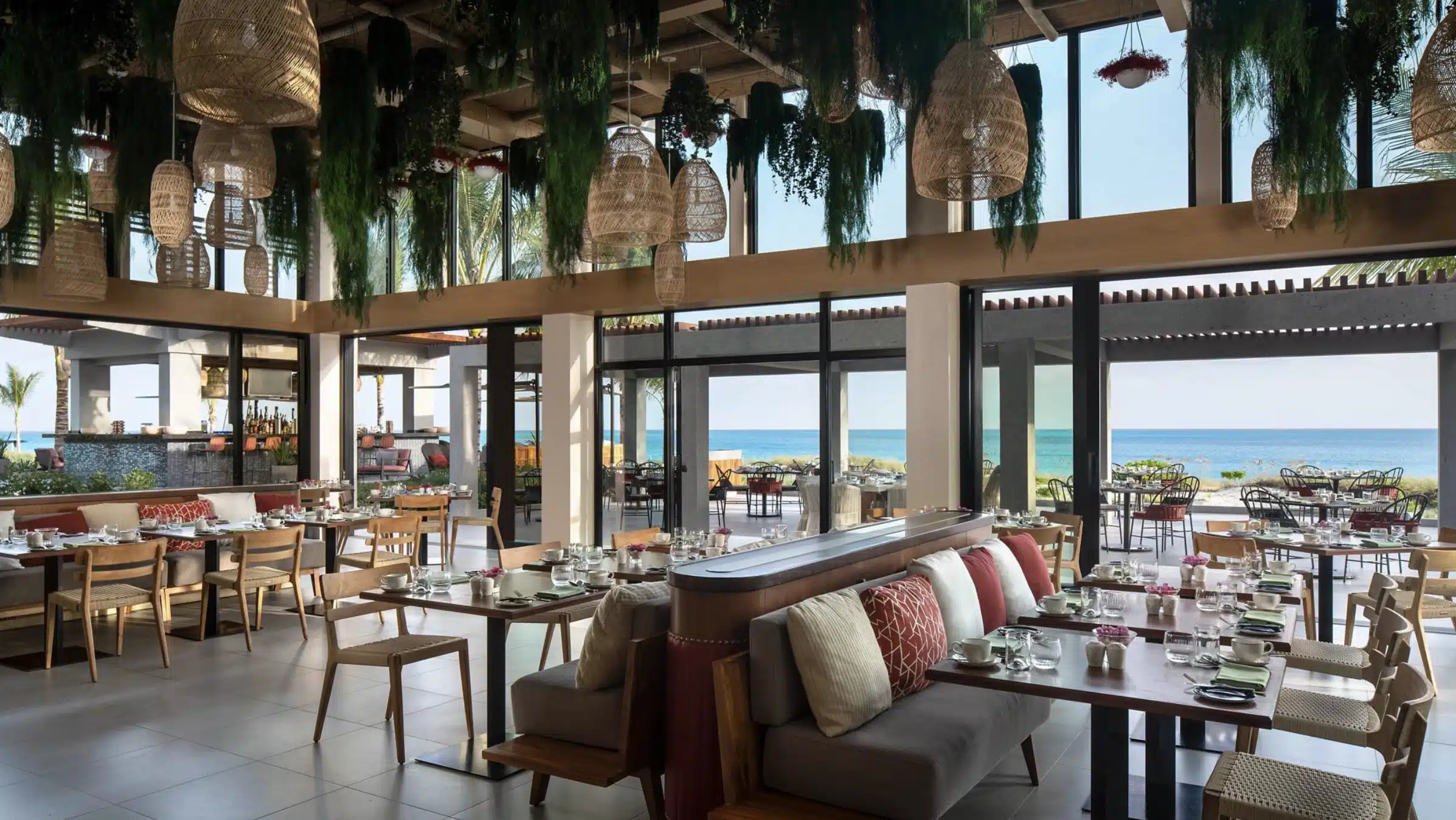
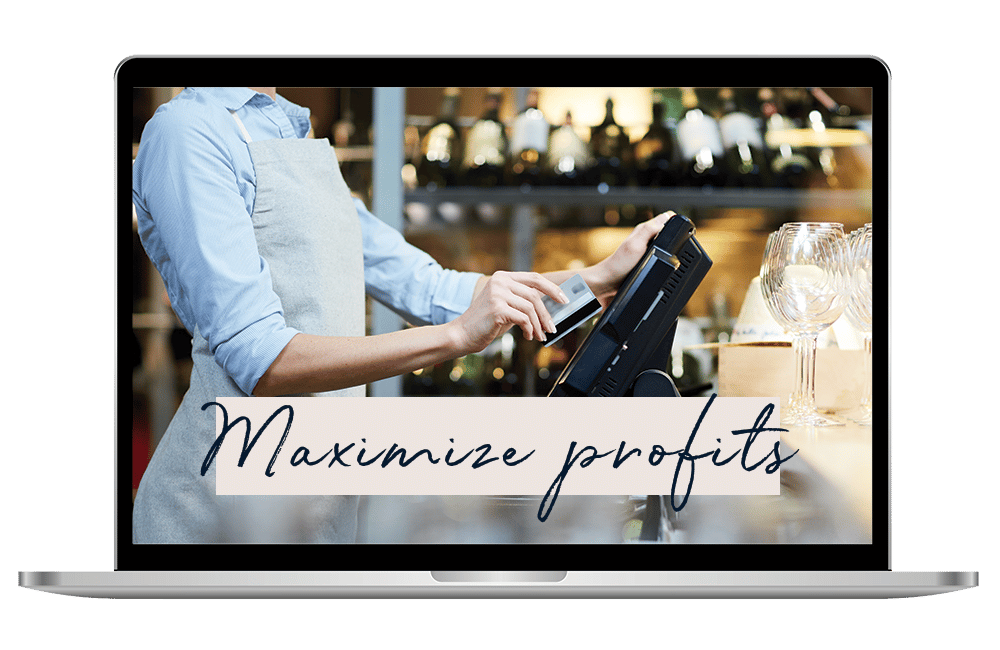
The three costly mistakes you could unknowingly be making?
Find out in this FREE guide and restaurant assessment specifically designed to reveal the unexpected hurdles standing between you and exponential business growth.
Thank You To Our Sponsors
For a limited time only, popmenu is offering our listeners $100 off your first month plus an unchanging lifetime rate.
Request a DEMO:

Automate Your Sales Tax. Why Not Try Davo FREE for 30 Days.
Want to become a podcast sponsor?
Please get in touch with Roger at roger@restaurantrockstars.com

